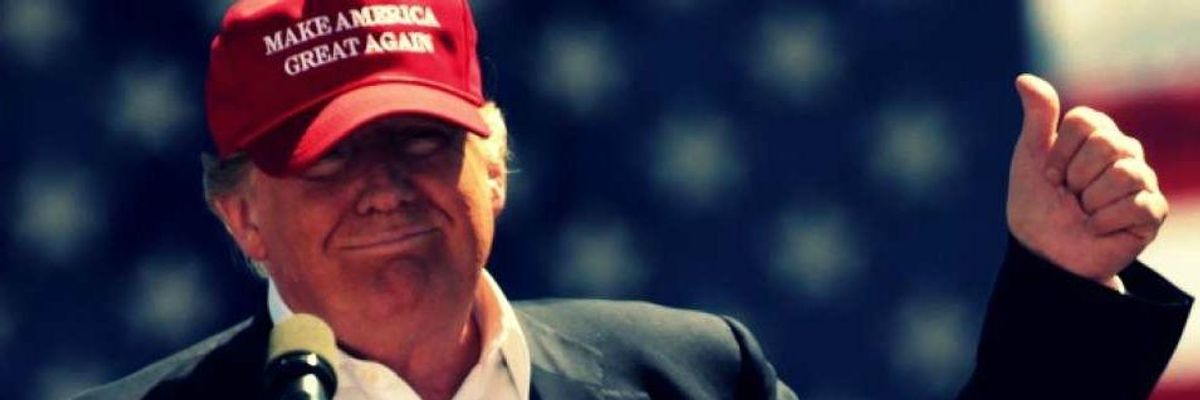Donald Trump's now ubiquitous slogan, "Make America Great Again!", is often chanted at rallies, but rarely scrutinized in public discourse. What era in America's past is Mr. Trump referring to when he says "Again"?
Would Mr. Trump prefer America return to the days of slavery, Jim Crow and labor exploitation in unsafe factories, mines, foundries and plantations? How about the late 19th century when "Robber Barons" monopolized one industry after another? Is he longing for the days when women were second-class citizens and couldn't vote, until securing this right less than 100 years ago, only to still be paid lower wages than their male colleagues for performing the same jobs and faced with consumer and educational discrimination?
Or is Trump referring to a time when the US was less of a giant empire than it is today?
Or, more optimistically, in the nineteen sixties and early seventies when America had its highest real wages and a large trade surplus? Has anyone heard him say he wanted to return America to that prominence that peaked in the nineteen sixties?
He surely doesn't want to raise wages for workers. On the campaign trail last year he said wages were too high and has not championed raising the frozen federal minimum wage (at $7.25 an hour) since.
He has spoken often about revising trade agreements to reduce our trade deficit, but he's not going to take on the opposition of the emigrating giant global corporations to reduce our trade deficit.
Maybe he wants to go back to the America before there was Medicare and Medicaid, before dangerous cars had to be recalled, before food had to be labelled, before unions existed to collectively bargain with large companies in the auto, steel and oil industries?
Does he miss the days when there were segregated restaurants, hotels, trains and buses? What about when people could smoke in your space on airplanes, in college lecture halls, hospital waiting rooms, cafes, offices and just about all public spaces, no matter the presence of children and asthmatics? Or when people with disabilities faced physical exclusion and career discrimination?
More benignly, perhaps Mr. Trump is longing for the days when there was less soil erosion, fewer toxic chemicals in the environment and more family farms. Or when there was far less obesity and diabetes and less aggressive marketing to children of fast food full of fat, sugar and salt. If so, he sure is not going to Make America Great with the corporatists he's appointed to run the Food and Drug Administration, the Environmental Protection Agency or the Department of Agriculture.
Does he want to Make America Great Again by returning to the days when there were fewer people in prisons per capita, fewer non-violent drug offenders serving long sentences, including juveniles, fewer if any private corporate prisons? If so, he is going to have problems with his Attorney General, Jeff Sessions. What about when casino gambling was highly restricted and only legal in Nevada? It's unlikely Mr. Trump would have wanted to prohibit gambling in his Atlantic City Casinos before they failed or went bankrupt. With his flurry of statements and Tweets endorsing sexual harasser and accused pedophile, defeated Senate candidate Roy Moore, Trump, given his boastful aggression toward women, certainly does not want to return to an America when such widely publicized misbehavior would have kept men from even running for office.
Maybe, Mr. Trump has a limited meaning to "Again." Maybe he means going back to a time when America was respected and feared in the world. Going back to the days when a smaller Japan and Germany made war on the US or when Britain played Woodrow Wilson and the US for suckers and got us into World War I, which led to World War II. Oh, such glorious nostalgia for Donald J. Trump.
What a speech Trump could give were he to explain what Making America Great Again means to him. He could explain his desire to go back to the prosperous Sixties when big corporations and the rich paid much higher taxes, didn't dare pay their CEOs more than 30 times the average wage in their companies and had to comply with a higher real minimum wage. He could wax nostalgic over the larger relative infrastructure budgets of the federal government, or the days when student debt was small or non-existent compared to the huge student debt load now imposed on this younger generation of Americans.
If all this sounds a little confusing, it is. Voters should have rejected such an unrebutted slogan repeated to applauding crowds again and again by Donald Trump in his get-away-with-anything presidential campaign of 2016.




